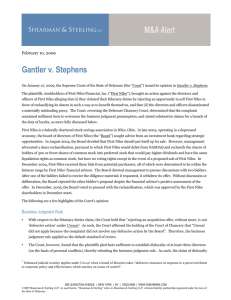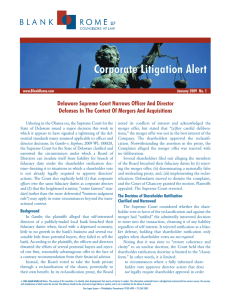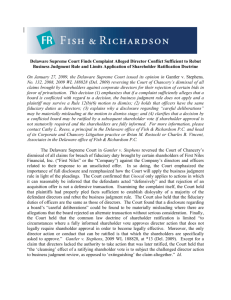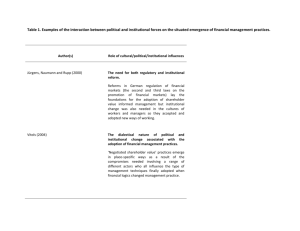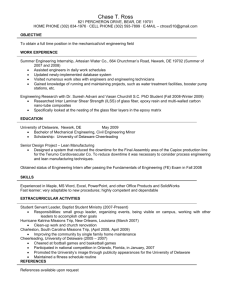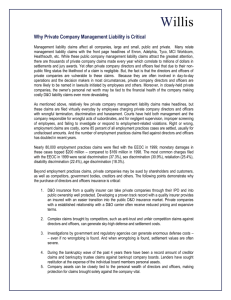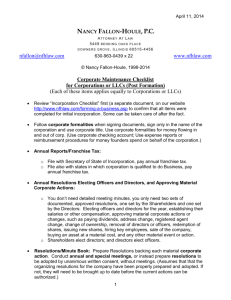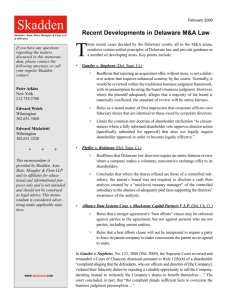January 29, 2009 To Our Clients and Friends: In Smith v. Van
advertisement
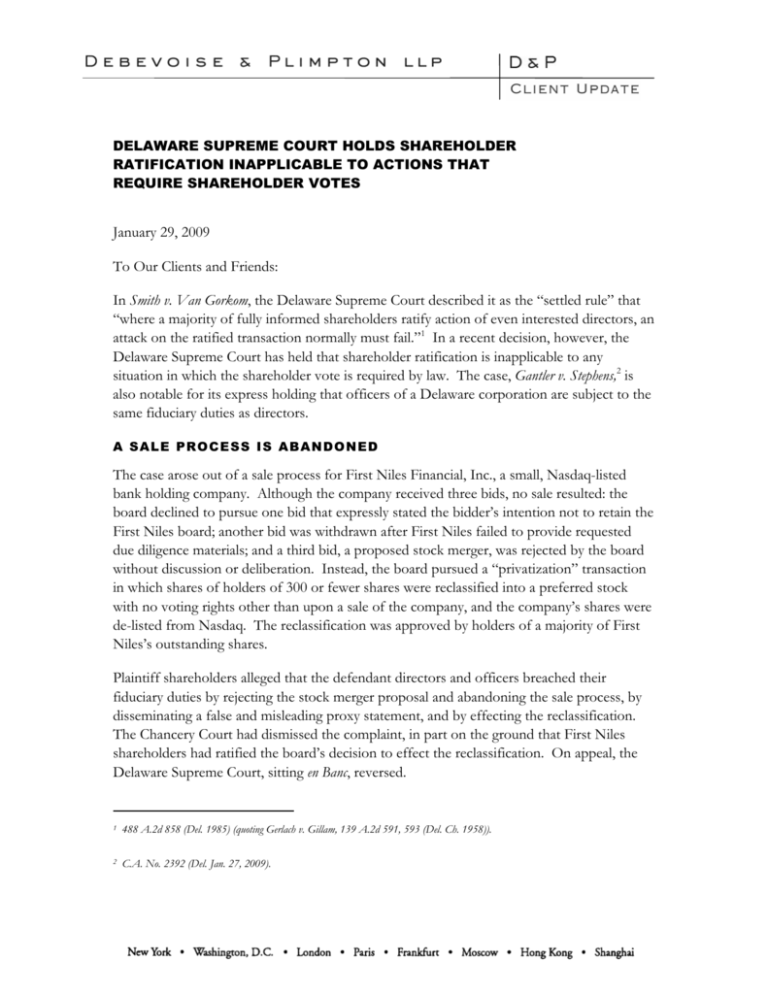
DELAWARE SUPREME COURT HOLDS SHAREHOLDER RATIFICATION INAPPLICABLE TO ACTIONS THAT REQUIRE SHAREHOLDER VOTES January 29, 2009 To Our Clients and Friends: In Smith v. Van Gorkom, the Delaware Supreme Court described it as the “settled rule” that “where a majority of fully informed shareholders ratify action of even interested directors, an attack on the ratified transaction normally must fail.”1 In a recent decision, however, the Delaware Supreme Court has held that shareholder ratification is inapplicable to any situation in which the shareholder vote is required by law. The case, Gantler v. Stephens,2 is also notable for its express holding that officers of a Delaware corporation are subject to the same fiduciary duties as directors. A SALE PROCESS IS ABANDONED The case arose out of a sale process for First Niles Financial, Inc., a small, Nasdaq-listed bank holding company. Although the company received three bids, no sale resulted: the board declined to pursue one bid that expressly stated the bidder’s intention not to retain the First Niles board; another bid was withdrawn after First Niles failed to provide requested due diligence materials; and a third bid, a proposed stock merger, was rejected by the board without discussion or deliberation. Instead, the board pursued a “privatization” transaction in which shares of holders of 300 or fewer shares were reclassified into a preferred stock with no voting rights other than upon a sale of the company, and the company’s shares were de-listed from Nasdaq. The reclassification was approved by holders of a majority of First Niles’s outstanding shares. Plaintiff shareholders alleged that the defendant directors and officers breached their fiduciary duties by rejecting the stock merger proposal and abandoning the sale process, by disseminating a false and misleading proxy statement, and by effecting the reclassification. The Chancery Court had dismissed the complaint, in part on the ground that First Niles shareholders had ratified the board’s decision to effect the reclassification. On appeal, the Delaware Supreme Court, sitting en Banc, reversed. 1 488 A.2d 858 (Del. 1985) (quoting Gerlach v. Gillam, 139 A.2d 591, 593 (Del. Ch. 1958)). 2 C.A. No. 2392 (Del. Jan. 27, 2009). CONFLICTS OF INTERESTS The Court agreed with the Chancery Court’s view that the decisions to reject the merger proposal and abandon the sale process were not subject to enhanced scrutiny under Unocal because the actions of the board could not properly be called “defensive.” However, the Court found that the board was not eligible for the protection of the business judgment rule at this stage because the plaintiffs had adequately alleged conflicting interests. While acknowledging that the prospect of directors losing their jobs was in itself insufficient to support an allegation of disloyalty, the Court noted that the proxy statement for the reclassification conceded that First Niles’ directors and officers had a conflict because each could structure the reclassification “in such a way that benefits his or her interests differently from the interests of unaffiliated shareholders.” In addition, the complaint alleged that one director was president of a company that provided heating and air conditioning services to the bank, and that another director was a principal in a law firm that represented First Niles and the bank. Lastly, allegations of the President, Chairman and CEO’s “unexplained” failure to respond to a bidder’s due diligence request and to inform the board of the due diligence problem, together with the bidder’s stated intention to terminate the incumbent board, were sufficient for the Court to infer that the CEO had acted disloyally. OFFICERS ’ FIDUCIA RY D UTI ES In considering the claims against the defendants who were officers of First Niles, the Court explicitly held that the fiduciary duties of officers are the same as those of directors – a rule a number of Delaware cases had assumed, but one not previously expressly embraced by the Delaware Supreme Court – and that the plaintiffs had adequately pled that First Niles officers breached their duties by “sabotaging” the due diligence process. The Court noted an important difference between the consequences of an officer’s and a director’s fiduciary breach: unlike directors, officers cannot be exculpated for breaches of the duty of care under Delaware General Corporation Law §102(b)(7). D IS C LOS U RE C LA IM S The Court next held that the Chancery Court erred by dismissing the plaintiffs’ disclosure claims, holding that complaint sufficiently alleged that the disclosure in the proxy statement stating that the board rejected the merger proposal only after “careful deliberations” was materially misleading because it failed also to disclose the circumstances under which one of the bidders withdrew, the insufficient deliberations by the board, and the directors’ personal financial motivations in effecting the reclassification. S HARE HOLDER RAT I FIC ATI ON Finally, the Court rejected the shareholder ratification defense accepted by the Chancery Court. The Court could have done so on the limited basis that the proxy disclosure was www.debevoise.com Page 2 defective, making informed ratification impossible. Instead, the Court stated that the scope and effect of the common law doctrine of shareholder ratification were “unclear,” and that, to “restore coherence and clarity to this area,” the shareholder ratification doctrine “must be limited to its so-called ‘classic’ form; that is, to situations where a fully informed shareholder vote approves director action that does not legally require shareholder approval in order to become legally effective.” The Court went further, narrowing the scope of the doctrine by holding that “the only director action or conduct that can be ratified is that which the shareholders are specifically asked to approve,” and that, with one exception (ratification of an action the directors lacked authority to make), shareholder ratification does not extinguish a challenge to director action, but rather subjects the challenged action to business judgment review. The Court overruled Smith v. Van Gorkom to the extent it holds otherwise. W HAT DOES IT MEA N The Gantler case is significant not only for its express holdings, but also because it provides another example of the Delaware courts’ propensity to find ways to review director conduct that they find questionable, even if it means limiting the application of doctrines (such as, in this case, the shareholder ratification doctrine) or laws (such as, in other cases, DGCL §102(b)(7)3) that in other circumstances have presented obstacles to such review. Please feel free to contact us with any questions. William D. Regner +1 212 909 6698 Gary W. Kubek +1 212 909 6267 Andrew L. Bab +1 212 909 6323 Jeffrey J. Rosen +1 212 909 6281 wdregner@debevoise.com gwkubek@debevoise.com albab@debevoise.com jrosen@debevoise.com 3 See, e.g., Ryan v. Lyondell Chemical Co., C.A. No. 3175 VCN (Del. Ch. July 29, 2008). www.debevoise.com Page 3
